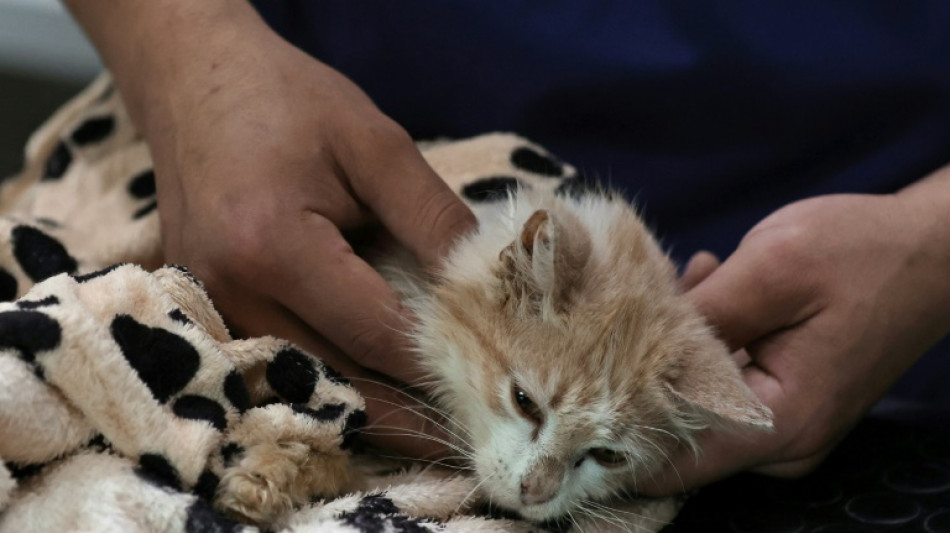
-
 UK launches paid military gap-year scheme amid recruitment struggles
UK launches paid military gap-year scheme amid recruitment struggles
-
Jota's children join tributes as Liverpool, Wolves pay respects

-
 'Tired' Inoue beats Picasso by unanimous decision to end gruelling year
'Tired' Inoue beats Picasso by unanimous decision to end gruelling year
-
Thailand and Cambodia declare truce after weeks of clashes

-
 Netanyahu to meet Trump in US on Monday
Netanyahu to meet Trump in US on Monday
-
US strikes targeted IS militants, Lakurawa jihadists, Nigeria says

-
 Cherki stars in Man City win at Forest
Cherki stars in Man City win at Forest
-
Schwarz records maiden super-G success, Odermatt fourth

-
 Russia pummels Kyiv ahead of Zelensky's US visit
Russia pummels Kyiv ahead of Zelensky's US visit
-
Smith laments lack of runs after first Ashes home Test loss for 15 years

-
 Russian barrage on Kyiv kills one, leaves hundreds of thousands without power
Russian barrage on Kyiv kills one, leaves hundreds of thousands without power
-
Stokes, Smith agree two-day Tests not a good look after MCG carnage

-
 Stokes hails under-fire England's courage in 'really special' Test win
Stokes hails under-fire England's courage in 'really special' Test win
-
What they said as England win 4th Ashes Test - reaction

-
 Hong Kongers bid farewell to 'king of umbrellas'
Hong Kongers bid farewell to 'king of umbrellas'
-
England snap 15-year losing streak to win chaotic 4th Ashes Test

-
 Thailand and Cambodia agree to 'immediate' ceasefire
Thailand and Cambodia agree to 'immediate' ceasefire
-
Closing 10-0 run lifts Bulls over 76ers while Pistons fall

-
 England 77-2 at tea, need 98 more to win chaotic 4th Ashes Test
England 77-2 at tea, need 98 more to win chaotic 4th Ashes Test
-
Somalia, African nations denounce Israeli recognition of Somaliland

-
 England need 175 to win chaotic 4th Ashes Test
England need 175 to win chaotic 4th Ashes Test
-
Cricket Australia boss says short Tests 'bad for business' after MCG carnage

-
 Russia lashes out at Zelensky ahead of new Trump talks on Ukraine plan
Russia lashes out at Zelensky ahead of new Trump talks on Ukraine plan
-
Six Australia wickets fall as England fight back in 4th Ashes Test

-
 Man Utd made to 'suffer' for Newcastle win, says Amorim
Man Utd made to 'suffer' for Newcastle win, says Amorim
-
Morocco made to wait for Cup of Nations knockout place after Egypt advance

-
 Key NFL week has playoff spots, byes and seeds at stake
Key NFL week has playoff spots, byes and seeds at stake
-
Morocco forced to wait for AFCON knockout place after Mali draw

-
 Dorgu delivers winner for depleted Man Utd against Newcastle
Dorgu delivers winner for depleted Man Utd against Newcastle
-
US stocks edge lower from records as precious metals surge

-
 Somalia denounces Israeli recognition of Somaliland
Somalia denounces Israeli recognition of Somaliland
-
The Cure guitarist and keyboard player Perry Bamonte dies aged 65

-
 Draper to miss Australian Open
Draper to miss Australian Open
-
Police arrest suspect after man stabs 3 women in Paris metro

-
 Former Montpellier coach Gasset dies at 72
Former Montpellier coach Gasset dies at 72
-
Trump's Christmas gospel: bombs, blessings and blame

-
 Russia lashes out at Zelensky ahead of new Trump meeting on Ukraine plan
Russia lashes out at Zelensky ahead of new Trump meeting on Ukraine plan
-
Salah helps Egypt beat South Africa and book last-16 place

-
 Australia's Ikitau facing lengthy lay-off after shoulder injury
Australia's Ikitau facing lengthy lay-off after shoulder injury
-
Another 1,100 refugees cross into Mauritania from Mali: UN

-
 Guardiola proud of Man City players' response to weighty issues
Guardiola proud of Man City players' response to weighty issues
-
Deadly blast hits mosque in Alawite area of Syria's Homs

-
 The Jukebox Man on song as Redknapp records 'dream' King George win
The Jukebox Man on song as Redknapp records 'dream' King George win
-
Liverpool boss Slot says Ekitike reaping rewards for greater physicality

-
 Judge jails ex-Malaysian PM Najib for 15 more years after new graft conviction
Judge jails ex-Malaysian PM Najib for 15 more years after new graft conviction
-
Musona rescues Zimbabwe in AFCON draw with Angola

-
 Zelensky to meet Trump in Florida on Sunday
Zelensky to meet Trump in Florida on Sunday
-
'Personality' the key for Celtic boss Nancy when it comes to new signings

-
 Arteta eager to avoid repeat of Rice red card against Brighton
Arteta eager to avoid repeat of Rice red card against Brighton
-
Nigeria signals more strikes likely in 'joint' US operations


Viral disease killing felines on 'cat island' Cyprus
A sickly ginger kitten named Bebe is pulled out of a cat carrier at a veterinary clinic in the Cypriot capital, Nicosia.
The six-month-old is suffering from a strain of feline coronavirus that is wreaking havoc on the prolific cat population of Cyprus.
Cats are everywhere on the eastern Mediterranean island, home to the earliest evidence of the animal's domestication and known by some as the "island of cats".
Many of the island's felines are strays. They wander at will into people's gardens, sit expectantly beside restaurant diners in hopes of a tasty morsel, and loiter near garbage bins.
Feline infectious peritonitis (FIP), which is not transmittable to humans, has rapidly spread across Cyprus in recent months, being "highly contagious" among cats, veterinarian Kostis Larkou said as he gently examined the visibly disoriented Bebe.
Animal advocates say the number of cats dying from disease is significantly higher than the 107 cases of FIP officially reported by the agriculture ministry in the southern part of the island.
"We have lost 300,000 cats since January" from FIP, said Dinos Ayiomamitis, head of Cats PAWS Cyprus and vice-president of Cyprus Voice for Animals.
Cyprus has been split since a 1974 Turkish invasion in response to a Greek-sponsored coup. The self-proclaimed Turkish Republic of Northern Cyprus, which covers the northern third of the island, is recognised only by Ankara.
But cats on both sides of the United Nations-patrolled buffer zone are dying from the illness.
Experts say the island's cat population is equal to or even exceeds the human population of a little more than one million.
In the south, Ayiomamitis estimates that a third of the cats have succumbed to the virus. Cats with FIP have symptoms including fever, abdominal swelling, weakness, and sometimes even aggressiveness.
But with so many stray cats, the contagion has proven difficult to diagnose and document.
- Ancient cat history -
Cypriots have a long and intertwined history with their furry friends.
Legend has it that a Roman empress, Helena, first brought cats to Cyprus to do away with poisonous snakes about 1,700 years ago.
But archaeological evidence of cats' domestication on the island dates back further than anywhere else in the world -- to 9,500 years ago at the Neolithic village of Shillourokambos, where the remains of a cat and a human were found deliberately buried together.
That bond between feline and human has continued through the millennia, leaving animal lovers like Ayiomamitis taking care of the island's cats today.
He has fears, though, for the roughly 60 cats he has been feeding at a cemetery in the capital for a quarter of a century.
"The colony is doing well, but we are worried because if one is infected, the others will be too," says the retiree, 70, as cats scampered up marble tombstones.
Several people who feed stray cats told AFP that many of their regulars are disappearing, and very few corpses are found, noting that when cats are sick, they often self-isolate and die alone.
An outbreak is suspected to be also spreading across cat populations in nearby Lebanon, Israel and Turkey, but in the absence of studies, that cannot be confirmed, said Demetris Epaminondas, vice president of the Pancyprian Veterinary Association.
To contain the spread, two treatment options have been considered. One is molnupiravir, an anti-Covid pill which officials say could not be authorised for use on animals in Cyprus.
Another antiviral tablet, GS-441524, chemically similar to the Covid-19 treatment remdesivir, is approved for animal use in Britain and for importation to Cyprus, with restrictions.
But its cost, at 3,000 to 7,000 euros (about $3,300-$7,700) per cat, is prohibitive, and there is no supply in Cyprus.
- Black market -
For weeks, Epaminondas has been trying to obtain government authorisation for molnupiravir, which would cost a far more affordable 200 euros per cat.
The agriculture ministry told AFP it was examining all possible means of addressing the issue through "various therapeutic preparations available on the European market".
Some have resorted to clandestine methods to save their pets.
"We bought our medicines on the black market online, or from Facebook groups. But we keep our suppliers secret so that we can continue to treat our animals," said one Cypriot, requesting anonymity because of the questionable legality of her actions.
Vasiliki Mani, 38, a member of several animal welfare organisations, is demanding a swift solution.
In January, she spent 3,600 euros to treat two stray cats with FIP.
"I have spent all my savings," she said, denouncing the cruelty of "allowing animals to die" in Cyprus.
If FIP continues to spread, Mani lamented, Cyprus will become "the island of dead cats".
L.Davis--AMWN



